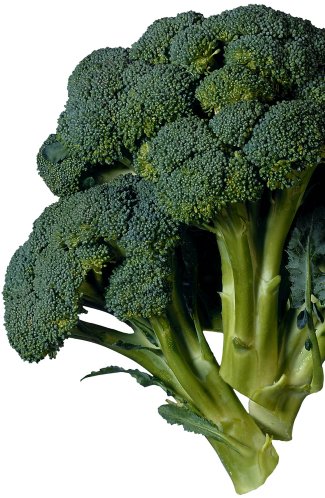 Broccoli Fights Cancer!
Eat Your Broccoli: Study Finds Strong Anti-Cancer Properties In Cruciferous Veggies It turns out Mom was right – you should eat your broccoli. But what Mom may not have known is why broccoli is so healthy, and how its lesser known, younger offshoot may be a powerful anti-cancer agent.
Even more promising results have been found in broccoli sprouts. The tiny, thread-like broccoli sprouts sold at stores next to alfalfa sprouts have more than 50 times the amount of sulforaphane than found in mature broccoli. Emily Ho, a researcher with the Linus Pauling Institute and an assistant professor in the Department of Nutrition and Exercise Sciences at OSU, will describe these dietary inhibitors for cancer prevention at the conference on "Diet and Optimum Health," organized by the Linus Pauling Institute. The conference will be held May 16-19 at the Hilton Hotel in Portland. Ho will speak at 10:30 a.m. Friday, May 18. Ho's main area of research is on the dietary prevention of prostate cancer. The Asian diet could be a key in this prevention. White males born in the United States have dramatically higher rates of prostate cancer than Asian men. But when Asian men live in the U.S. for five years or more, their rates of prostate cancer rise significantly, Ho says. Past studies in Ho's lab have focused on dietary elements in cancer prevention such as green tea and soy. In her new study, which was published in the Journal of the Society of Experimental Biology and Medicine, Ho and her colleagues at Linus Pauling Institute looked at cruciferous vegetables. While many cruciferous vegetables have sulforaphane, broccoli and broccoli sprouts have the highest amount and thus could be a major player in the prevention of prostate and colon cancer. Ho said drugs classified as histone deacetylase (HDAC) inhibitors are being looked at as potentially preventing cancer. She said their research shows that these same effects of inhibiting HDAC might be obtained by consumption of cruciferous vegetables. "I would say if you’re at all worried about cancer or at high risk of cancer, especially of prostate or colon cancer, then increasing your dietary intake of broccoli and other vegetables could be a good idea," Ho said. "It certainly can't hurt. And drugs can have negative side effects and be difficult to administer." While Ho said the research is not at the point where she can make a specific recommendation on how much broccoli or bok choy to eat, she personally tries to have two servings of cruciferous vegetables a day. In human subjects, just eating some broccoli sprouts on top of a bagel with cream cheese resulted in HDAC inhibition. "The compound in broccoli may be one of the strongest anti-cancer fighters we have," Ho said.
Broccoli and Other Vegetables Linked with Decreased Risk of Aggressive Prostate Cancer Science Daily — Eating more cruciferous vegetables like broccoli and cauliflower is associated with a reduced risk of aggressive prostate cancer. Several studies have demonstrated an association between eating vegetables and a reduced risk of prostate cancer, but study results have not been consistent and many have not investigated the association among patients with aggressive prostate cancer. Victoria Kirsh, Ph.D., of Cancer Care Ontario in Toronto and colleagues evaluated the possible association in 1,338 prostate cancer patients diagnosed in the Prostate, Lung, Colorectal and Ovarian Cancer Screening Trial. Each of the men completed a 137-item food-frequency questionnaire. They found that eating fruits and vegetables was not associated with decreased prostate cancer risk in general. But greater consumption of dark green and cruciferous vegetables, especially broccoli and cauliflower, was associated with a decreased risk of aggressive prostate cancer. "Aggressive prostate cancer is biologically virulent and associated with poor prognosis. Therefore, if the association that we observed is ultimately found to be causal, a possible means to reduce the burden of this disease may be primary prevention through increased consumption of broccoli, cauliflower, and possibly spinach," the authors write. This research was published recently in the Journal of the National Cancer Institute. Note: This story has been adapted from a news release issued by Journal of the National Cancer Institute.
UPDATE A Substance Found In Broccoli And Brocolli Sprouts Kill Cancer Stem Cells Submitted by Rasik Sharma on Sat, 05/08/2010 It seems one can easily treat breast cancer with the help of a substance, a University of Michigan study found a substance found in broccoli and broccoli sprouts killed cancer stem cells and prevented new tumors from growing in mice and human cell cultures in the lab. Researchers believe getting rid of cancer cells could be the key to treating and preventing cancer, as currently chemotherapy does not work against stem cells, leading to the cancer spreading, making it necessary for women to get mammograms. However, researchers at the University of North Carolina found screening mammograms to produced poor accuracy, with higher rates of women in their mid to late 30s requiring further testing, including actual cancer detection rates to be extremely low.
|
 Researchers at the Linus Pauling Institute at Oregon State University have found that sulforaphane – a compound found in cruciferous vegetables such as broccoli, bok choy and brussels sprouts – has strong anti-cancer properties.
Researchers at the Linus Pauling Institute at Oregon State University have found that sulforaphane – a compound found in cruciferous vegetables such as broccoli, bok choy and brussels sprouts – has strong anti-cancer properties.